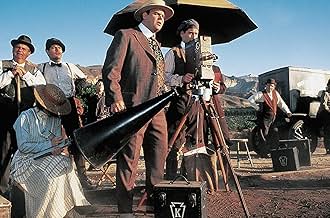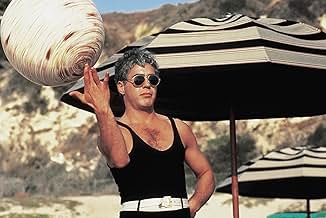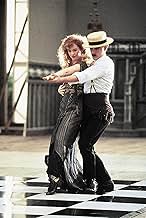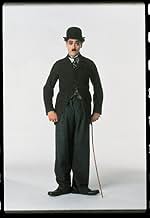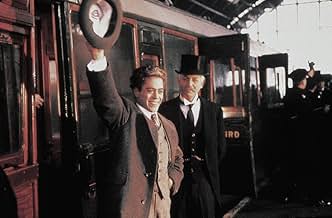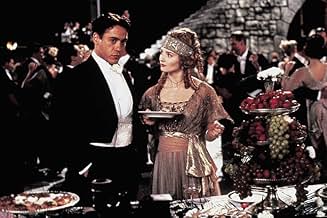Una película sobre la controvertida y difícil vida del máster de la comedia Charlie Chaplin.Una película sobre la controvertida y difícil vida del máster de la comedia Charlie Chaplin.Una película sobre la controvertida y difícil vida del máster de la comedia Charlie Chaplin.
- Dirección
- Guión
- Reparto principal
- Nominado para 3 premios Óscar
- 3 premios y 20 nominaciones en total
Deborah Moore
- Lita Grey
- (as Deborah Maria Moore)
Reseñas destacadas
An attempt to make a film that is both honest and at the same time shamelessly self-serving about its (auto)biographical subject -- the legendary comedian/director Chaplin -- is pulled off with style. It's fun to see some modern talents inhabit the roles of screen's bygone icons (though in some cases a little less charicature would have been appreciated, especially in the case of Mabel Normand). Kline, surprisingly enough, makes a convincing Fairbanks. The rest of the cast is also well-picked -- X-Files fans should watch closely to catch quite a few glimpses of lower-billed David Duchovny as Chaplin's personal editor.
The direction is very good; I particularly liked how some of the straight scenes were filmed in a comic, surrealist style (Chaplin's escape from the police w/ his cans of "the Kid" reels is staged like a Keystone Komedy), while some of what might have been more comic elements are played straight (Chaplin's attempt to convince his brother that "The Tramp" cannot talk in a movie is both funny and serious, for example). Some of the (perhaps true to life) melodramatic elements are a bit overplayed (the bit with his mom was handled too heavily for my tastes, especially her shouting his name as she's dragged away by the asylum guards), but generally the film avoids genre cliches and "easy" scenes.
Great photography.
Downey Jr. fits the roll well, even rising to many of the physical challenges of the Chaplin mystique.
A superior film of its type, laced with self-conscious humor and self-reflection on the artistic temperament.
The direction is very good; I particularly liked how some of the straight scenes were filmed in a comic, surrealist style (Chaplin's escape from the police w/ his cans of "the Kid" reels is staged like a Keystone Komedy), while some of what might have been more comic elements are played straight (Chaplin's attempt to convince his brother that "The Tramp" cannot talk in a movie is both funny and serious, for example). Some of the (perhaps true to life) melodramatic elements are a bit overplayed (the bit with his mom was handled too heavily for my tastes, especially her shouting his name as she's dragged away by the asylum guards), but generally the film avoids genre cliches and "easy" scenes.
Great photography.
Downey Jr. fits the roll well, even rising to many of the physical challenges of the Chaplin mystique.
A superior film of its type, laced with self-conscious humor and self-reflection on the artistic temperament.
This is a great example of a movie I took a chance on one rainy Sunday at a theater in Charlotte, NC., and was highly rewarded with an intriguing look at the life of an early film star set against the background of early Hollywood. I had't heard much buzz about it and didn't really know much about Charlie Chaplin. Downey is amazing in his personification of Chaplin. If you want to expand your horizons and learn a little about the inside workings of the film industry from circa World War I thru the 50's, this award-winning movie comes highly recommended.
A film about the troubled and controversial life of the master comedy filmmaker Charles Chaplin.
What can I say? This was a really good film. It touched on all the highlights of Chaplin's career, both high and low. And even with the lengthy run time, I feel like it could have been even longer. It had such a great pace and was enjoyable to watch. And the cast. Wow. Milla Jovovich before she blew up? Diane Lane? Very good casting.
Robert Downey Jr nailed it. He has the look, he did the physical comedy, and that had to take a lot of training... the drunk routine, wow! I am so glad that Downey is back on top these days with "Iron Man" and other films. He had a rough patch for a while, but he is far better of an actor than he is generally given credit for.
What can I say? This was a really good film. It touched on all the highlights of Chaplin's career, both high and low. And even with the lengthy run time, I feel like it could have been even longer. It had such a great pace and was enjoyable to watch. And the cast. Wow. Milla Jovovich before she blew up? Diane Lane? Very good casting.
Robert Downey Jr nailed it. He has the look, he did the physical comedy, and that had to take a lot of training... the drunk routine, wow! I am so glad that Downey is back on top these days with "Iron Man" and other films. He had a rough patch for a while, but he is far better of an actor than he is generally given credit for.
Robert Downey Jr., first of all, portrays Chaplin with amazing accuracy. Some parts of this performance are particularly memorable, such as his invention of the famous tramp's walk just after having feverishly picked out the outfit, the astonishingly accurate depiction of Charlie as an old man, and of course, the many parts of the film that involve parts of his life where he was working on his own films. These are clearly some of the most interesting parts of the movie, if only because these films are how we know him, but it is at least as interesting the way that the film hints towards things that happened in Chaplin's life that inspired those films.
Very early in the film, we see a scene in which Charlie's mother is booed off the stage by an impatient crowd, so Charlie, who is a little boy at the time, gets on stage to do a song and dance of his own. He performs a song that is very similar to the one his mother performed, but he wins the audience's heart and they respond by tossing coins onto the stage for him. You can't help noticing how this corresponds with the constantly youthful look of the Tramp (in Modern Times, for example, Chaplin was in his late 40s but looked like a teenager), and the coins tossed on stage may have played a significant role in helping him realize that this could be a good way to make money.
Charlie moves to America to pursue his dream, and we see the landmark events that punctuated his dizzying rise to stardom. He goes to work briefly on stage and is then hired by Mack Sennett, a gigantic figure in film history, but is unsatisfied because of his own lack of control over his work. It should also be noted here that there is a scene where he is working with director Mabel Normand, who demands acting from him that he does not agree with, and with whom he clashes. In 1914, Chaplin starred in a 9 ½ minute film called Mabel's Busy Day, in which he plays the uncharacteristic role of the antagonist. The Mabel in this film is a sporting event vendor who turns down Charlie's amorous advances, after which Charlie proceeds to steal all of her products and hand them out to anyone standing nearby. Then in 1920, he starred in another short comedy called Mabel's Strange Predicament, in which Mabel is a woman who becomes locked out of her hotel room in her pajamas and ends up avoiding the drunken Charlie for the rest of the film. In both films, Charlie plays uncharacteristic roles, the most unenviable of which was in Mabel's Busy Day, which Mabel Norman directed.
Later in the film we see Charlie in a small diner just after having terminated his employment with Mack Sennett, and he meets Edna Purviance in a scene that is reminiscent of his romantic endeavors in such early films as Caught In A Cabaret and, even more so, The Immigrant, one of his most famous early films. There are dozens of other references to the development of his cinematic personality - such as his sudden realization of how to make the Tramp appear rich to the blind girl in City Lights without talking, as well as the dance of the dinner rolls, which Charlie performs here at a dinner at an expensive restaurant - but there is an even more significant portrayal of Charlie's beliefs and his values in this movie that are more recognizable as well as more memorable to people not familiar with his earlier and less known work.
Charlie Chaplin was one of many filmmakers' in the earlier times of the medium that resented and disapproved of the coming of sound to the movies. His Tramp remains one of the most recognized figures in the history of the cinema, and it is widely known that the Tramp is an almost entirely silent character, so it is necessary for a film about Chaplin's life to address this in some way, and it is done perfectly here. There is a scene where Charlie's brother is trying to convince him to add spoken dialogue into his films and Charlie refuses outright, giving a hilarious example of a Russian ballet dancer and saying, `The Tramp CAN'T talk. The minute he talks, he's dead.' This is a brilliant way to illustrate Charlie's fondness for the silent film, as well as his knowledge that no voice given to the Tramp would fit his character right. He was too well known to be changed so profoundly.
Charlie Chaplin created 81 movies in his lifetime, many of them timeless and truly memorable, and has made a significant impact on the filmmaking medium as well as on the world itself. He was a fascinating personality both onscreen and off, which is another element of his life that was necessarily and skillfully presented in this film, this time directly in the dialogue in what is probably the single most important line in the entire film `If you want to understand me, watch my movies.' Chaplin's ever-present sympathy for the underprivileged is subtly but effectively portrayed as two poor people approach him on his way out of a nice restaurant, right at the beginning of the Great Depression, asking for his autograph. The elderly Charlie notes in retrospect that, `I wish they'd wanted my money.'
He is always aware throughout the film and throughout his life of the difficulties constantly facing poor people, and he wants to give these people not only an escape with his films, but hope for the future. There is a point in the film where Charlie has returned to Europe to see an old friend, and he learns on the train that she has died. He is then asked, `What'll we do, Charlie?' And his answer, although spoken under his breath almost in a whisper, rings louder than anything else in the film.
`Smile.'
Very early in the film, we see a scene in which Charlie's mother is booed off the stage by an impatient crowd, so Charlie, who is a little boy at the time, gets on stage to do a song and dance of his own. He performs a song that is very similar to the one his mother performed, but he wins the audience's heart and they respond by tossing coins onto the stage for him. You can't help noticing how this corresponds with the constantly youthful look of the Tramp (in Modern Times, for example, Chaplin was in his late 40s but looked like a teenager), and the coins tossed on stage may have played a significant role in helping him realize that this could be a good way to make money.
Charlie moves to America to pursue his dream, and we see the landmark events that punctuated his dizzying rise to stardom. He goes to work briefly on stage and is then hired by Mack Sennett, a gigantic figure in film history, but is unsatisfied because of his own lack of control over his work. It should also be noted here that there is a scene where he is working with director Mabel Normand, who demands acting from him that he does not agree with, and with whom he clashes. In 1914, Chaplin starred in a 9 ½ minute film called Mabel's Busy Day, in which he plays the uncharacteristic role of the antagonist. The Mabel in this film is a sporting event vendor who turns down Charlie's amorous advances, after which Charlie proceeds to steal all of her products and hand them out to anyone standing nearby. Then in 1920, he starred in another short comedy called Mabel's Strange Predicament, in which Mabel is a woman who becomes locked out of her hotel room in her pajamas and ends up avoiding the drunken Charlie for the rest of the film. In both films, Charlie plays uncharacteristic roles, the most unenviable of which was in Mabel's Busy Day, which Mabel Norman directed.
Later in the film we see Charlie in a small diner just after having terminated his employment with Mack Sennett, and he meets Edna Purviance in a scene that is reminiscent of his romantic endeavors in such early films as Caught In A Cabaret and, even more so, The Immigrant, one of his most famous early films. There are dozens of other references to the development of his cinematic personality - such as his sudden realization of how to make the Tramp appear rich to the blind girl in City Lights without talking, as well as the dance of the dinner rolls, which Charlie performs here at a dinner at an expensive restaurant - but there is an even more significant portrayal of Charlie's beliefs and his values in this movie that are more recognizable as well as more memorable to people not familiar with his earlier and less known work.
Charlie Chaplin was one of many filmmakers' in the earlier times of the medium that resented and disapproved of the coming of sound to the movies. His Tramp remains one of the most recognized figures in the history of the cinema, and it is widely known that the Tramp is an almost entirely silent character, so it is necessary for a film about Chaplin's life to address this in some way, and it is done perfectly here. There is a scene where Charlie's brother is trying to convince him to add spoken dialogue into his films and Charlie refuses outright, giving a hilarious example of a Russian ballet dancer and saying, `The Tramp CAN'T talk. The minute he talks, he's dead.' This is a brilliant way to illustrate Charlie's fondness for the silent film, as well as his knowledge that no voice given to the Tramp would fit his character right. He was too well known to be changed so profoundly.
Charlie Chaplin created 81 movies in his lifetime, many of them timeless and truly memorable, and has made a significant impact on the filmmaking medium as well as on the world itself. He was a fascinating personality both onscreen and off, which is another element of his life that was necessarily and skillfully presented in this film, this time directly in the dialogue in what is probably the single most important line in the entire film `If you want to understand me, watch my movies.' Chaplin's ever-present sympathy for the underprivileged is subtly but effectively portrayed as two poor people approach him on his way out of a nice restaurant, right at the beginning of the Great Depression, asking for his autograph. The elderly Charlie notes in retrospect that, `I wish they'd wanted my money.'
He is always aware throughout the film and throughout his life of the difficulties constantly facing poor people, and he wants to give these people not only an escape with his films, but hope for the future. There is a point in the film where Charlie has returned to Europe to see an old friend, and he learns on the train that she has died. He is then asked, `What'll we do, Charlie?' And his answer, although spoken under his breath almost in a whisper, rings louder than anything else in the film.
`Smile.'
The first thing one should know about "Chaplin" is that, paradoxically, very little of it has to do with Chaplin. Or, at least, it has more to do with the writers' illusions of him. The film claims to be based on "My Autobiography" and on "Chaplin: His Life and Art", by David Robinson. Having re-read the Autobiography before watching the film, it is clear to me that what the writers did was take basic incidents from the autobiography and embellish them with, I can only assume, parts of the Robinson book. What results is a series of scenes which were vaguely influenced by the facts, but so simplified and primitive that little of the original truth remains.
What the writers did not wish to acknowledge was that when Chaplin wrote vaguely or skimmed past certain parts of his life, he really didn't want anyone to delve into them - and the filmmakers did just that. "Chaplin" is not really about Charlie Chaplin, his work and films. It is simply ceaseless speculation on his personal life, but going on even more vaguely about it than the Autobiography.
I am well aware that almost every biopic focuses more on the personal life of a person than on their work. The problem is that most of the characters in "Chaplin" are so exaggerated and simplified that they become almost completely unbelievable - both as the real people AND as fictional characters. None of them are fully developed. This is not entirely the fault of the supporting cast (although it really is not that interesting): the fault lies with the screenplay, which is too often bland and melodramatic. This is especially obvious in the ridiculous subplot concerning the older Chaplin and his editor, which is the most pointless and badly done part of the film; even Hopkins cannot make the lines sound credible, which is all the proof anyone needs of their mediocrity. The film would have worked immeasurably better without these additions.
Many of the most interesting aspects and parts of Chaplin's life are completely ignored, oddly, with seemingly irrelevant or less important stories added in for little reason. One scene in particular is added only to insert a Chaplin-esquire physical comedy sequence which falls flat. The writers greatly accentuated everything to do with Hetty Kelly, even making the same actress play Oona O'Neill; the tried too hard to give him some kind of motive for his relationships, which only leads to more bias and speculation; and although I am by no means a Chaplin purist or even a very knowledgeable admirer, the blatant alterations on the actual history grated on my nerves.
All this being said, the film is certainly not a terrible one. Mainly, however, this is for one reason only, and that is - yes - Robert Downey Jr. himself. The praise he received for the role is by no means undeserved. As Chaplin he is perfect, managing to make the best out of his rather predictable lines, remaining interesting, believable, and in many parts moving. He has wonderful timing and intensity, and even looks the part (he could even do the roll dance). I really quite believed he was Chaplin. Even his performance, however, suffers greatly because of the lines - and the flash-forwards. I have no doubt that he could have played an even better Charlie Chaplin in a differently made film.
The greatest scene in "Chaplin", I think, is the opening credits: Charlie arrives in his dressing room, alone, sits, and begins to remove his make-up. The scene is in black and white, and there is no dialogue - only music. Every emotion is expressed simply through his eyes. If the rest of the film had been made like this, I actually think it could have been perfect. Either way, the lead performance is astounding, the music is beautiful, and though not very insightful or too true to history, this film is well worth watching.
What the writers did not wish to acknowledge was that when Chaplin wrote vaguely or skimmed past certain parts of his life, he really didn't want anyone to delve into them - and the filmmakers did just that. "Chaplin" is not really about Charlie Chaplin, his work and films. It is simply ceaseless speculation on his personal life, but going on even more vaguely about it than the Autobiography.
I am well aware that almost every biopic focuses more on the personal life of a person than on their work. The problem is that most of the characters in "Chaplin" are so exaggerated and simplified that they become almost completely unbelievable - both as the real people AND as fictional characters. None of them are fully developed. This is not entirely the fault of the supporting cast (although it really is not that interesting): the fault lies with the screenplay, which is too often bland and melodramatic. This is especially obvious in the ridiculous subplot concerning the older Chaplin and his editor, which is the most pointless and badly done part of the film; even Hopkins cannot make the lines sound credible, which is all the proof anyone needs of their mediocrity. The film would have worked immeasurably better without these additions.
Many of the most interesting aspects and parts of Chaplin's life are completely ignored, oddly, with seemingly irrelevant or less important stories added in for little reason. One scene in particular is added only to insert a Chaplin-esquire physical comedy sequence which falls flat. The writers greatly accentuated everything to do with Hetty Kelly, even making the same actress play Oona O'Neill; the tried too hard to give him some kind of motive for his relationships, which only leads to more bias and speculation; and although I am by no means a Chaplin purist or even a very knowledgeable admirer, the blatant alterations on the actual history grated on my nerves.
All this being said, the film is certainly not a terrible one. Mainly, however, this is for one reason only, and that is - yes - Robert Downey Jr. himself. The praise he received for the role is by no means undeserved. As Chaplin he is perfect, managing to make the best out of his rather predictable lines, remaining interesting, believable, and in many parts moving. He has wonderful timing and intensity, and even looks the part (he could even do the roll dance). I really quite believed he was Chaplin. Even his performance, however, suffers greatly because of the lines - and the flash-forwards. I have no doubt that he could have played an even better Charlie Chaplin in a differently made film.
The greatest scene in "Chaplin", I think, is the opening credits: Charlie arrives in his dressing room, alone, sits, and begins to remove his make-up. The scene is in black and white, and there is no dialogue - only music. Every emotion is expressed simply through his eyes. If the rest of the film had been made like this, I actually think it could have been perfect. Either way, the lead performance is astounding, the music is beautiful, and though not very insightful or too true to history, this film is well worth watching.
¿Sabías que...?
- CuriosidadesGeraldine Chaplin played her real-life paternal grandmother Hannah Chaplin.
- PifiasWhen Charlie is shown at the 1972 Oscars near the end of the movie, he is showed being brought to the podium in the wheelchair and then standing at the podium as the movie clips played. In the actual awards ceremony, Charlie walked out to the podium under his own power after the clips ended.
- Citas
German Diplomat: [offering his hand] Mr. Chaplin! I am a great admirer of yours.
Charlie Chaplin: I'm sorry, I prefer not to shake hands with Nazis.
German Diplomat: [laughs nervously] What have you got against us, Mr. Chaplin, hm?
Charlie Chaplin: What have you got against everybody else?
- Créditos adicionalesThe film ends with the final scene of El circo (1928): Charlie Chaplin walks off into the distance.
- Versiones alternativasTo receive a 12 certificate the original UK cinema version was cut to remove one use of 'fucking' (during Charlie's homecoming visit to a pub). Later releases were uncut and upgraded to a 15 rating.
- ConexionesFeatured in Friday Night: Episodio #1.11 (1992)
- Banda sonoraThe Honeysuckle and The Bee
Written by Albert Fitz and William H. Penn (as William Penn)
Selecciones populares
Inicia sesión para calificar y añadir a tu lista para recibir recomendaciones personalizadas
- How long is Chaplin?Con tecnología de Alexa
Detalles
Taquilla
- Presupuesto
- 31.000.000 US$ (estimación)
- Recaudación en Estados Unidos y Canadá
- 9.493.259 US$
- Fin de semana de estreno en EE. UU. y Canadá
- 84.669 US$
- 27 dic 1992
- Recaudación en todo el mundo
- 9.493.259 US$
- Duración2 horas 23 minutos
- Color
- Relación de aspecto
- 1.85 : 1
Contribuir a esta página
Sugerir un cambio o añadir el contenido que falta



